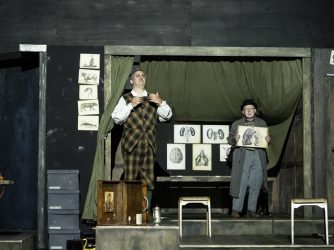 United Kingdom Sarah Angliss, Giant: Soloists, Stephen Hiscock (percussion), Reiko Ichise (viola da gamba), Olwen Foulkes (recorder), Nicola Hicks (viola), Tiaho Soares Silva, Amalia Young (violins) / Ben Smith (conductor/harpsichord). Linbury Theatre, Royal Opera House, Covent Garden, 12.3.2024. (CC)
United Kingdom Sarah Angliss, Giant: Soloists, Stephen Hiscock (percussion), Reiko Ichise (viola da gamba), Olwen Foulkes (recorder), Nicola Hicks (viola), Tiaho Soares Silva, Amalia Young (violins) / Ben Smith (conductor/harpsichord). Linbury Theatre, Royal Opera House, Covent Garden, 12.3.2024. (CC)

Production:
Director – Sarah Fahie
Set designer – Hyemi Shin
Costume designer – Nicky Gillibrand
Lighting designer – Adam Silverman
Cast:
Charles Byrne – Karim Sulayman
John Hunter – Jonathan Gunthorpe
Rooker – Galina Averina
Madame DuVal / Curator – Anna Cavaliero
Sister Mary / Curator – Melanie Pappenheim
Howison – Steven Beard
First heard at Aldeburgh in July 2023, Sarah Angliss’ Giant received its London premiere in this run of performances at the Linbury Theatre. A gruesome tale of medical experimentation, human exploitation and body stealing, it is based on the true story of Charles Byrne (1761-1783), the Irish giant. Byrne (Karim Sulayman) held an unhealthy fascination for surgeon John Hunter (Jonathan Gunthorpe) who visits the giant, who has been publicly paraded, and offers him friendship and support (including money). Although friendly, there is an ulterior motive, to access Byrne’s body postmortemly, to dissect and then display him.
Understandably, Byrne is far from thrilled at the idea and asks his manager, Rooker (Galina Averina) to steal his corpse and to give him a sea burial at Margate. Countering this, Hunter sends his assistant Howison (Steven Beard) to spy on Byrne at his deathbed and to interrupt the funerary procession – when the coffin hits water at Margate, it contains rocks. In possession of Byrne’s body, Hunter sets to work on it, over-enthusiastically scorching the bones and losing evidence for medical research in the process. Some might be familiar with the tale via Hilary Mantel’s book The Giant, O’Brien.
To echo the two strands of the tale, Hunter and Byrne, the stage is split into two, with the doctor’s study to the left and Byrne’s bedroom to the right. In a dissection of the operatic process, the performers are visible onstage – our metaphorical glimpse of the ‘skeleton’ that is usually in the pit.
It is not a happy tale, but it is one well told. The mix of electronic music – highly atmospheric, sometimes in the manner of a sound installation than representing ongoing musical discourse – meets acoustic instruments, carillons from the percussion and the Baroque sound of a viola da gamba, plus a recorder that sometimes sounds like a shakuhachi. The highly experienced Reiko Ichise is the viola da gambist, who positively shines throughout, at one point moving centre stage in a curious example of post-Baroque Minimalism – a mesmeric, held-breath moment. The music represents, perhaps, a liminality that echoes death itself, and that shadowy world is itself encapsulated perfectly in Adam Silverman’s lighting.
The two Curators, Anna Cavaliero and Melanie Pappenheim, who both have split roles, act as a Greek Chorus of sorts, commenting in a neutral fashion. Their voices are exquisitely matched. Melanie Pappenheim sang in the Aldeburgh premiere; but in Aldeburgh, it was Héloise Werner who joined her. Angliss’ music throughout has a haunting tinge; the funeral procession is inspired by that in John Blow’s Venus and Adonis yet translated into sounds of our time. Angliss’ music is the liminal in sound – somehow, the viola da gamba sounds even more disturbingly haunting in this context.

The two main roles are taken with consummate mastery. John Hunter is shown dissecting his own son (which event is said to be taken from history); he manipulates in the worst possible fashion and yet Angliss allows us some understanding and compassion. Her take, in conjunction with Sarah Fahie’s superb staging, is far from black-and-white. Both of these roles in London featured the original Aldeburgh soloists: Jonathan Gunthorpe as a phenomenal John Hunter, slightly obsessive, finnicky, fantastically fanatical. The giant himself was Lebanese-American tenor Karim Sulayman, completely inside the role, tormented, gullible, desperate (and tall).
As the impresario Rooker, Galina Averina impresses – completely convincing in her manipulations; Steven Beard is a dramatically strong Howison (Hunter’s assistant). But this opera is more than the sum of its parts: like Insula’s Sky Burial it brings death up close, inviting us, the audience, to perhaps dissect our attitudes to the final moment, and therein perhaps lies the key to sympathy for Hunter and his beliefs.
The libretto, by Ross Sutherland, is consistent within itself. Hyemi Shin’s sets perfectly accommodate Angliss’ concept. The event is clearly well-attended, and so it deserves to be. I use the word ‘event’ purposefully. This is opera, for sure, but in her atmospherics, Angliss invites us to see this also as primarily drama which happens to have music and happens to be (mainly) sung.
Absolutely recommended, therefore. Much care has gone into Giant at every stage, from conception to stage realisation, that much shines through every minute.
Colin Clarke
